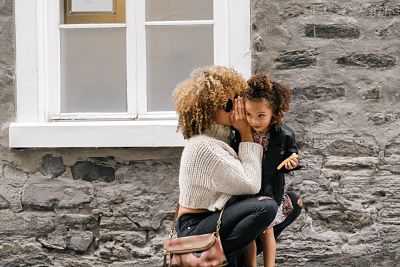What’s really influencing how you parent? Are you true to your values?
I’m not sure what I thought parenting would be like. I had an idea in my head: that I’d be pregnant, and it’d be really amazing, and I’d take a lot of nice pictures… and of course, then I get this adorable baby, and I take a lot more pictures. I had in my imagination that it would be lovely, and I’d push a pram, and it would be wonderful.
And, it certainly was, and is wonderful. But it was also incredibly challenging, and it forced me to grow as a person. Parenting is as much about your children growing and developing as it is about parents growing and developing too. Parenting changes you, and makes you rethink the things in your life that are important.
It’s clear that child behaviour is linked to child development. We know that our child’s behaviour will change as they grow and develop, but your child’s behaviour is also linked to how you parent your children. It’s linked to you as a parent – because of the genetic heritage that you passed on – whether that’s something you interpret as a gift or something you see as more of a burden. And, your child’s behaviour is also linked to the values you hold within your family, to how you spend time together, to the things that you do, to how you shape your child through your own thinking.
And that’s an incredibly special thing.
As parents, we get to choose a lot of the experiences that our children have. We get to pick which preschool they go to, which school. Whether they learn to dance, or speak a second language. We get to pick (at least in the early years) the people they spend time with. As parents, our influence is everywhere in the beginning. And if you are anything like me, you probably agonise over getting the bigger decisions right.
But our children also have hundreds of small experiences with us every single day. Small experienced from the moment they wake up until the moment they go to bed at night. They have experiences that we don’t think so much about, that we take for granted. Experiences that include the way we look at them, the tone of our voice, our level of patience, our own reactions to the world. In fact – if you’ve got babies or toddlers, or an anxious child, they’re probably still having experiences with you right through the night too!
When I’m working with parents, it’s about supporting them to become the best parent that they can be, so that they can raise great children. I don’t have all the answers, despite all my training – because for me, I believe finding those answers is individual.
What I mean by that is – take a second and think about parenting. You’re probably thinking about your own parenting, but what I actually want you to think about is your own family of origin. I want you to think about your parents. What were they like? What kind of person have you become because of your parents? What values did your parents have?
In my family, honesty was a really big thing. You could get in all kinds of trouble, and you could get away with almost everything, but if you lied to my mother, it was the end! Because honesty was a very highly prized value in my family. It was the top of the list of things that were important inside a family. It was seen as part of the foundation of trust and love. Honesty was bigger than the school my parents picked, it was more important in my family than the fact that my second language ended up being French.
I’m sure we all think honesty is important – but it’s not as highly prized in every single family. Think about your family – it’s quite likely that there will be other values that are higher. Things like kindness. Perhaps your family values kindness. Perhaps your family valued other things more – values like respect, humility, achievement, working hard, doing your best. Family values can be linked to cultures, and they are important, even when unspoken. Because those values play our in behaviours, and shape us all.
Take a second and think about what your parents valued. What did they pass down to you?
If your parents passed values to you, then the big question is… what are you going to pass to your children? Do you want to pass down the same values? Do you get to choose?
For me, I certainly like the value of honesty, but in my family, kindness is placed as a higher value than honesty. So, if my kids had to choose between being kind, or being honest, I want them to pick kindness. I still want them to choose to be honest too, but it’s important to know what values I have. Because once I know what I value, I can choose what I want my kids to value. I can teach them how I make choices, and hard decisions that I can sit with.
Knowing my values positively influences how I parent. Because I value kindness, it helps me to pause and reflect on how I want to parent. As a Psychologist, I believe it’s important to think about your values so that you’re clear on them. Values tend not to change, they’re the things that we hold incredibly dear to u. When we get them wrong, when we act out of line with our values, it tends to bother us, and cause emotional discomfort.
I think I’ll always find it difficult to lie – because my mother prized honesty. It’s really difficult for me. Even those socially acceptable little white lies! I’ve had to retrain myself to think differently.
I was raised with that value for 20 years while I lived at home. It can be important to think about how would like to shape your children – because your own parents’ values, the ones your parents installed inside you, they are a strong influence. And that means that your values, the values that you embed deep inside your child – they will shape your child’s life too.
___________________________________________
Article by Dr Amanda Mullin, Doctor of Clinical Psychology.
Phot0 credit: Sai De Silva
about author

Dr Amanda Mullin, Founder of Mindworx Psychology & Doctor of Clinical Psychology
subscribe to newsletter
Keep up to date with the latest in evidence based treatments

